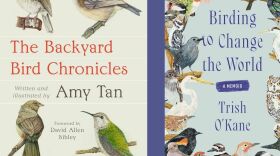Barbara J. King
Barbara J. King is a contributor to the NPR blog 13.7: Cosmos & Culture. She is a Chancellor Professor of Anthropology at the College of William and Mary. With a long-standing research interest in primate behavior and human evolution, King has studied baboon foraging in Kenya and gorilla and bonobo communication at captive facilities in the United States.
Recently, she has taken up writing about animal emotion and cognition more broadly, including in bison, farm animals, elephants and domestic pets, as well as primates.
King's most recent book is How Animals Grieve (University of Chicago Press, 2013). Her article "When Animals Mourn" in the July 2013 Scientific American has been chosen for inclusion in the 2014 anthology The Best American Science and Nature Writing. King reviews non-fiction for the Times Literary Supplement (London) and is at work on a new book about the choices we make in eating other animals. She was awarded a Guggenheim Fellowship for her work in 2002.
-
Nature's healing power is an immensely personal focus for Foster. He made his film after being burned out from long, grinding hours at work. After the release of the film, he suffered from insomnia.
-
Novelist Amy Tan's The Backyard Bird Chronicles centers on an array of birds that visit her yard, as Trish O'Kane's Birding to Change the World recalls lessons from birds that galvanized her teaching.
-
Here the New York Times columnist and author of Late Migrations and Graceland Margaret Renkl brings alive in 52 chapters her love for the animals and plants in her yard and nearby parks in Tennessee.
-
Activist Greta Thunberg was just 15 when she called on the world to take action on the climate crisis. Just as impressively, she has now pulled together essays by 100 scholars on what's needed now.
-
Writer Margaret Renkl's sense of joyful belonging to the South co-exists with her intense desire for Southerners who face prejudice or poverty finally to be embraced and supported.
-
The very antithesis of a fox-taming tale, Catherine Raven's memoir shows us that we are surrounded by wild animals who make thoughtful decisions and experience joys and sorrows on their own terms.
-
In his debut book Evolution Gone Wrong, Alex Bezzerides mixes the technical anatomical stuff we need to know with vivid examples and humorous phrases — in offering us some answers.
-
Abigail Tucker's descriptions of how radically women may change at the time of motherhood — and, as an extension, how this might affect their ability to focus on other things — gets pretty harrowing.
-
Investigative reporter Michael Moss explores how some food companies tweak their products to take advantage of evolved biology, creating room for novelty that triggers the brain to make us want more.
-
Harvard University's Daniel Lieberman looks at exercise from an evolutionary point of view, concluding that we evolved to limit our physical activity where possible, saving it for survival activities.










